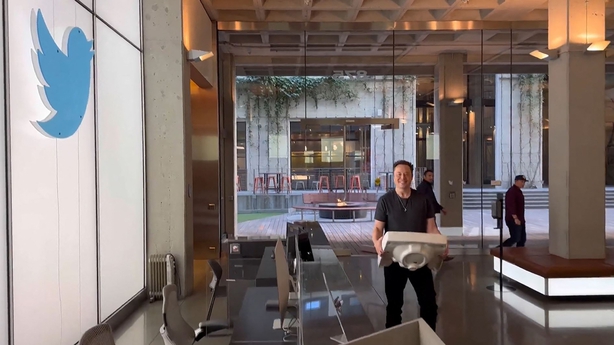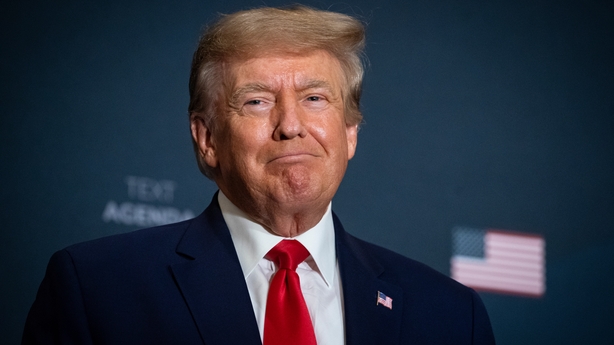New Twitter owner Elon Musk has said people who have been banned from the social media site will not be reinstated until a review by a "content moderation council".
Twitter staff and users had been waiting to hear more details from Mr Musk about his plans for the platform, amid concerns over his support for loosening content moderation and reversing permanent bans on controversial accounts.
Mr Musk's latest comment appears to mean no immediate return to Twitter for several high-profile and polarising figures who had been previously banned, including former US president Donald Trump.
Writing on the platform, Mr Musk said: "Twitter will be forming a content moderation council with widely diverse viewpoints.
"No major content decisions or account reinstatements will happen before that council convenes."
Mr Musk is expected to address staff at the company's headquarters in San Francisco later, after completing his high-profile $44 billion takeover of the social media giant.
It comes after it was reported that Mr Musk is set to take on the role of chief executive at Twitter, replacing Parag Agrawal, who was one of several senior executives to be fired as the takeover was completed, but may eventually cede the role in the longer term.
Upon completion of the takeover, Mr Musk said "the bird is freed," in an apparent nod to his desire to see the company have fewer limits on content that can be posted.
the bird is freed
— Elon Musk (@elonmusk) October 28, 2022
The CEO of electric car maker Tesla has, however, also said he wants to prevent the platform from becoming an echo chamber for hate and division.
Other goals include wanting to "defeat" spam bots on Twitter and make the algorithms that determine how content is presented to its users publicly available.
Yet Mr Musk has not offered details on how he will achieve all this. He has said he plans to cut jobs, leaving Twitter's approximately 7,500 employees fretting about their future.
He also said yesterday he did not buy Twitter to make more money, but "to try to help humanity, whom I love."
Before closing the $44bn acquisition, and never afraid to indulge in theatrics, Mr Musk walked into Twitter's headquarters on Wednesday carrying a porcelain sink, subsequently tweeting "let that sink in".

He changed his description in his Twitter profile to "Chief Twit."
He also tried to calm fears among employees that major layoffs are coming and assured advertisers that his past criticism of Twitter's content moderation rules would not harm its appeal.
"Twitter obviously cannot become a free-for-all hellscape, where anything can be said with no consequences!" Mr Musk said in an open letter to advertisers yesterday.
Mr Musk also said in May he would reverse the ban on Mr Trump, who was removed after the attack on the US Capitol, although the former US president has said he will not return to the platform. He has instead launched his own social media app, Truth Social.
Mr Trump today hailed the sale of Twitter to Mr Musk, saying he was pleased it was "now in sane hands".
"I am very happy that Twitter is now in sane hands, and will no longer be run by Radical Left Lunatics and Maniacs that truly hate our country," Mr Trump said on his Truth Social platform.

Mr Musk has also indicated he sees Twitter as a foundation for creating a "super app" that offers everything from money transfers to shopping and ride-hailing.
But Twitter is struggling to engage its most active users who are vital to the business. These "heavy tweeters" account for less than 10% of monthly overall users but generate 90% of all tweets and half of global revenue.
The deal is the culmination of a remarkable saga, full of twists and turns, that sowed doubt over whether Mr Musk would complete the deal. It began on 4 April, when Mr Musk disclosed a 9.2% stake in the company, making him its largest shareholder.
The world's richest person then agreed to join Twitter's board, only to balk at the last minute and offer to buy the company instead for $54.20 per share.
Over the course of just one weekend later in April, the two sides reached a deal at the price he suggested.
This happened without Mr Musk carrying out any due diligence on the company's confidential information, as is customary in an acquisition.
In the weeks that followed, Mr Musk had second thoughts. He complained publicly that he believed Twitter's spam accounts were significantly higher than Twitter's estimate, published in regulatory filings, of less than 5% of its monetizable daily active users. His lawyers then accused Twitter of not complying with his requests for information on the subject.
The acrimony resulted in Mr Musk giving notice to Twitter on 8 July that he was terminating their deal on the grounds that Twitter misled him about the bots and did not cooperate with him. Four days later, Twitter sued Mr Musk in Delaware, where the company is incorporated, to force him to complete the deal.
By then, shares of social media companies and the broader stock market had plunged on concerns that the Federal Reserve's interest rate hikes, as it seeks to fight inflation, will push the US economy into recession.
Twitter accused Mr Musk of buyer's remorse, arguing he wanted to get out of the deal because he thought he overpaid.
Most legal analysts said Twitter had the strongest arguments and would likely prevail in court. Their view did not change even after Twitter's former security chief Peiter Zatko stepped forward as a whistleblower in August to allege that the company failed to disclose weaknesses in its security and data privacy.
On 4 October, just as Mr Musk was set to be deposed by Twitter's lawyers ahead of the start of their trial later in the month, he performed another U-turn and offered to complete the deal as promised. He managed to do that, just one day ahead of an 28 October deadline given by the Delaware judge to avoid going to trial.
EU digital chief warns Musk Twitter must abide by 'rules'
The EU official overseeing internet regulation has warned Mr Musk that the social media giant must play by the bloc's rules in Europe.
"In Europe, the bird will fly by our (EU) rules," EU internal market commissioner Thierry Breton tweeted, in response to Mr Musk writing that "the bird is freed".
The 27-nation bloc is imposing landmark legislation aimed at reining in the power of US tech giants and forcing them to more closely screen illegal or harmful online content.
👋 @elonmusk
— Thierry Breton (@ThierryBreton) October 28, 2022
In Europe, the bird will fly by our 🇪🇺 rules.#DSA https://t.co/95W3qzYsal
Mr Musk said the EU's new Digital Services Act was "exactly aligned with my thinking" when he met with Mr Breton in May.

